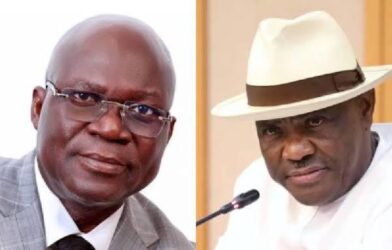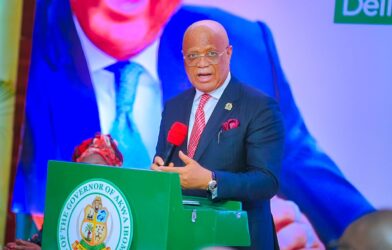The Federal Government, on Monday, denied reintroducing the subsidy on Premium Motor Spirit, popularly called petrol, amid the closure of many filling stations nationwide due to various challenges in the downstream oil sector.
It also said the pockets of queues observed by motorists in petrol stations across the country stemmed from hiccups in product distribution from the South to the North, not a lack of supply.
This came as the Nigerian National Petroleum Company Limited also declared on Monday that it would have gone bankrupt in June this year had it been the President, Bola Tinubu, did not halt subsidy on PMS in May.
NNPCL also announced that Nigeria would become a net exporter of refined petroleum products by next year, going by efforts to revamp its refineries.
Nigeria, through the NNPCL, currently imports PMS and other refined petroleum products consumed across the country, which has been ongoing for decades.
The Group Chief Executive Officer, NNPCL, Mele Kyari, told State House Correspondents after an audience with the President at the Aso Rock Villa that fuel subsidy had not been returned.
“No subsidy whatsoever. We are recovering our full cost from the products that we import. We sell to the market, and we understand why the marketers are unable to import. We hope that they do it very quickly and these are some of the interventions the government is doing. There is no subsidy,” he stated.
Also, oil marketers had repeatedly stated that fuel subsidy had returned, as they explained that the landing cost of petrol as of last week was N720/litre. The commodity is currently sold at between N580/litre and N617/litre, depending on the area of purchase.
PENGASSAN’s National President, Festus Osifo, had said the government still subsidised petrol due to the cost of crude oil in the international market and the exchange rate.
“They [government] are paying subsidy today. In reality, today, there is subsidy because, as of when the earlier price was determined, the price of crude in the international market was around $80 for a barrel.
“But today, it has moved to about $93/94 per barrel for Brent crude. So, because it has moved, the price [of petroleum] also needed to move. The only reason the price will not move is when you can manage your exchange rate effectively and you can pump in supply and bring down the exchange rate.
“So, if the exchange rate comes down today, we will not be paying subsidy. But with the exchange rate value and the price of crude oil in the international market, we have introduced subsidy,” Osifo had explained.
In his inaugural address after taking the oath of office on May 29, 2023, Tinubu announced that the Federal Government was closing the curtains over the subsidy era.
“We shall instead re-channel the funds into better investment in public infrastructure, education, health care, and jobs that will materially improve the lives of millions. Petrol subsidy is gone!” Tinubu had declared.
The President’s announcement sparked the increase in fuel price from N197 to between N480 and N570. The pump price was subsequently reviewed upward to N617/litre.
Addressing journalists about the gradual return of fuel queues, on Monday, the NNPCL boss said, “We have seen in a very few states pockets of very low queues not unconnected with the road situation.
“We’re seeing the number of blockades on our road crossing products from the Southern depots into the Northern part of the country and it takes them much longer than they do now.
“They have to reroute the trucks around many locations for them to be able to reach, creating delays and some supply gaps. But that has been filled and we do not see such problems again.”
While arguing that supply remained robust, Kyari explained that the full deregulation of the downstream sector had created market competition.
“You must have noticed some fuel stations will reduce prices by two Naira and three Naira, so customers will naturally run to the places where you have that price reduction.
“That creates panic because those who don’t know why they are doing it will think something wrong is happening.
“Supply is robust. We have over 1.4 billion litres of product, both marine and land. Also, there are no issues around delivering those products onto the land. So, there is no fear, nothing to bother about,” Kyari argued.
The NNPC chief revealed that the firm was liaising with other oil marketers to address the forex challenges.
He clarified, “We’re engaging them to resolve alongside other agencies of government and critical issues around access to foreign exchange.
“Government is doing so much to ensure supply of FX into the market. We know this FX market will stabilise the current I&E window at around 770.
Kyari, speaking at a different function in Abuja on Monday, noted that the NNPCL would have gone bankrupt in June this year if Tinubu had not removed the subsidy on petrol.
He also revealed that about 25 licences that were meant for the construction of refineries in Nigeria had remained idle due to subsidies on refined petroleum products, particularly PMS.
He further stated that Nigeria would become a net exporter of refined petroleum products by 2024 based on concerted, ongoing efforts to get the country’s refineries running.
This came as oil marketers raised concern about the continuous closure of filling stations nationwide due to the crisis around foreign exchange and their inability to import petrol into Nigeria.
Speaking at the Energy and Labour Summit organised by the Petroleum and Natural Gas Senior Staff Association of Nigeria in Abuja, Kyari stated that NNPCL was spending over N400bn on PMS subsidy monthly.
He said the immediate halt of the scheme by Tinubu on the assumption of office on May 29, 2023, was a life-saver for the oil firm.
“There were several attempts to do this in the past, spanning about 20 years, but it didn’t happen because there was a communication gap, by the wrong assumptions that when you take out subsidies, enormous pain will come. And that was a very difficult historical conversation.
“If there is one thing that stifles growth in the downstream sector of the petroleum industry, it is the existence of subsidies, and that is the reality. There are today close to 25 licences to create, build and operate refineries, (but) nobody will take the next step.
“Because as long as you do not have certainty around pricing and who will pay for that difference, no one will put his money.”
Kyari said people would always cut corners as long as the market was not determining the price of petroleum products, adding that subsidy should have gone since February 2022 based on the provisions of the Petroleum Industry Bill.
The NNPCL boss stated that the National Assembly intervened and requested that the subsidy be sustained until June 30, 2023.
“Obviously, budget is one thing; funding is a different thing. And I can tell you that since 2022, when that provision was made until May 29, 2023, not a single naira was paid to the NNPC Ltd as cost of subsidy. That means we are carrying it entirely on the balance sheet of NNPCL.
“So we were heading towards what we can technically call bankruptcy of the NNPCL because you will go into negative cash flow. By the end of June 2023, we would have been in a negative cash flow. What it simply means is that NNPC would have been bankrupt if that bold decision was not taken by Mr President,” Kyari stated.
The NNPCL boss also noted that though there was no credible petrol consumption figure in Nigeria, subsidy removal on PMS caused a drop in the volume of PMS evacuated from depots by over 30 per cent.
“The evacuation from the depots declined by 30 per cent since the removal of the subsidy,” he stated.
He said this was another reason why the Federal Government and NNPCL were making efforts to provide Compressed Natural Gas as an alternative to PMS, adding that this would bring down the pressure on petrol.
“CNG as an automobile fuel is very effective, cheaper, and cleaner. That is why we are putting enormous effort both as NNPC Ltd and as the government to scale up access to CNG. That will bring down the pressure on PMS and the reason is very simple.
“Today the way gas is priced, it doesn’t escalate as you see for PMS. And therefore in today’s market, you will probably see N200 or N230 equivalent to a litre of PMS. That means instead of N617/litre in Abuja, you can actually buy gas at about a third of the price,” Kyari stated.
The NNPCL helmsman also pointed out that the oil company was the only importer of petrol into the country at the moment, as he noted that other marketers were not bringing petrol due to concerns around assessing foreign exchange.
He said, “We are the only downstream company importing PMS into the country, none of them (marketers) can do it today. That means we can manage the market situation without creating any subsidy environment. But for them, access to foreign exchange is difficult. We have access to fx (forex). We create fx.
“Therefore we have access to forex but their access to forex is limited. That means they have to put any price and hedge for the future so that they don’t lose money tomorrow, and that is why you are seeing the N900 AGO (diesel) pricing.”
Kyari’s position on forex constraints was buttressed by oil dealers, as the National President of the Natural Oil and Gas Suppliers Association of Nigeria, Benneth Korie, stated that marketers had stopped importing PMS.
“Owners of filling stations find it extremely difficult to secure funds to procure products for their retail outlets. Both independent and major marketers are terribly affected.
“As of today, filling stations are shutting down in great numbers on a daily basis and dealers are going out of business with many more on the verge of bankruptcy because of their inability to secure funds to facilitate orders for their stations.”
Meanwhile, in his speech at the summit, the President of PENGASSAN, Festus Osifo, said the recent policy direction of the government had “placed untold hardship on Nigerians.
“Chief of which is the PMS subsidy removal and the floating of the naira-dollar exchange rate.”
Credit: Punch












Comments are closed